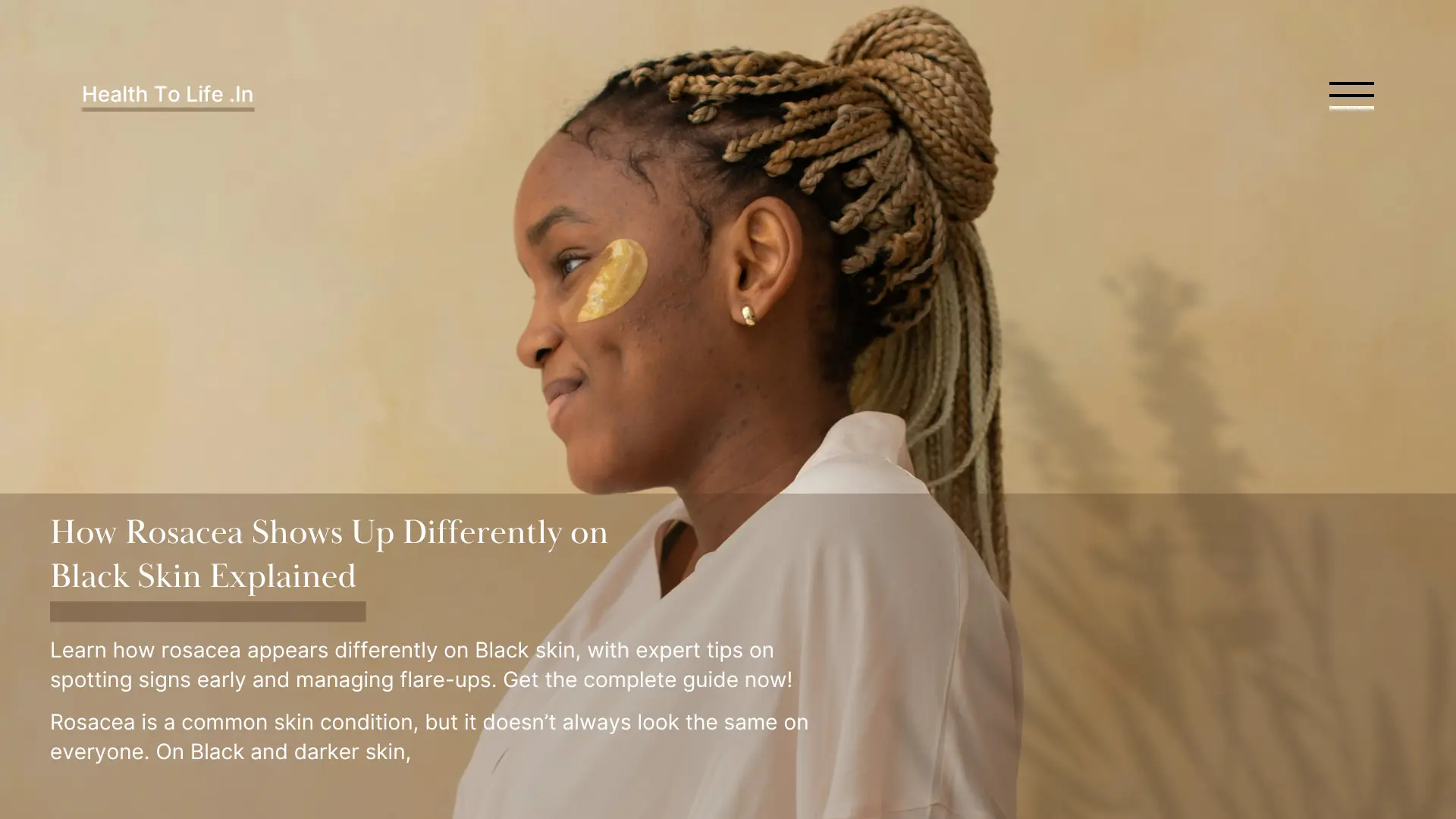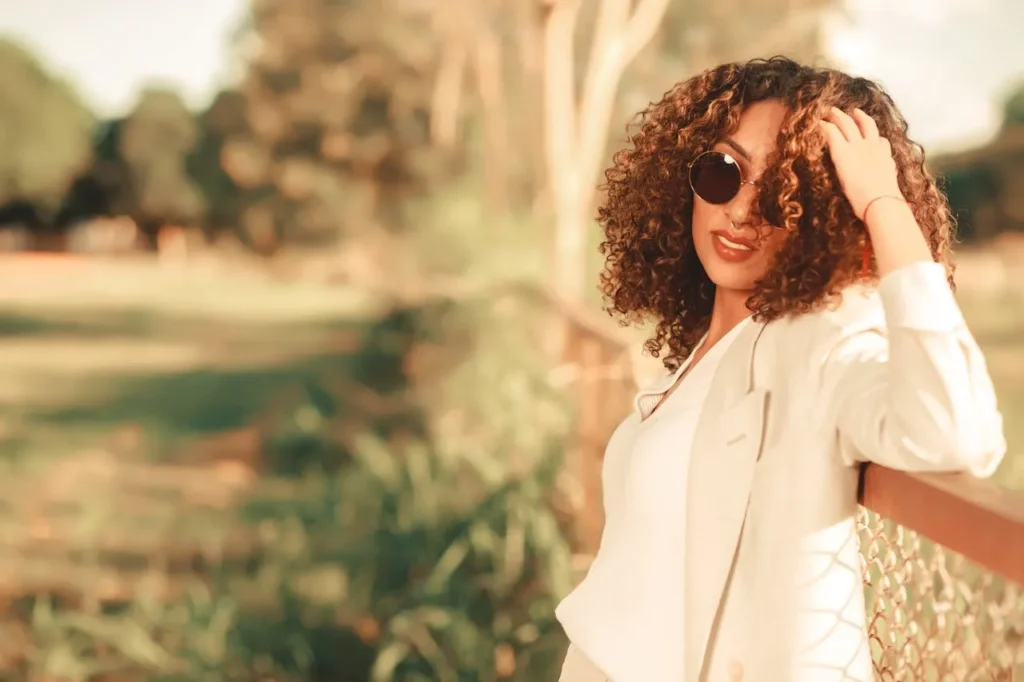
What Is Rosacea? Breaking Down the Basics
Rosacea is a common skin condition, but it doesn’t always look the same on everyone. On Black and darker skin, rosacea often shows up differently, making it harder to spot and sometimes leading to misdiagnosis.
While fair skin may turn visibly red, darker skin tones might show swelling, bumps, or a burning sensation instead. This difference is important because early treatment helps prevent symptoms from getting worse.
In this guide, we’ll explain how rosacea appears on Black skin, share care tips, and help you recognise signs early to get the right treatment and feel confident in your skin.
- Learn more about rosacea treatment options here.
Table of Contents
- How Rosacea Symptoms Differ in Black Skin
- Real-Life Stories: Rosacea Experiences in the Black Community
- Early Warning Signs You Shouldn’t Ignore
- Why Standard Rosacea Pictures Don’t Show Dark Skin Symptoms
- The Link Between Rosacea and Hyperpigmentation in Black Skin
- Safe Treatment Options Tailored for Darker Skin Tones
- Preventing Flares: Lifestyle and Dietary Tips for People with Dark Skin
- FAQs & Myth Busting About Rosacea in Black Skin
- Final Thoughts
- Related Video | Treat Rosacea Doctors Tips| Asian/ Black Skin | Rosacea Mistakes | Rosacea Skin Care
How Rosacea Symptoms Differ in Black Skin
Rosacea is a chronic skin condition that mostly affects the face. It’s known for causing redness, visible blood vessels, and small bumps that can look like acne. But on Black skin, these signs may not be as easy to see. Instead of redness, you might notice areas that feel warm, swollen, or tender. Some people also develop darker patches called hyperpigmentation.
Understanding these differences is key to getting the right diagnosis and avoiding treatments that can irritate darker skin tones.
Real-Life Stories: Rosacea Experiences in the Black Community
On Black and darker skin, rosacea symptoms can be tricky to spot. The classic redness that shows up on lighter skin isn’t always visible. Instead, you might notice small bumps that look like acne, swelling, or a burning and stinging feeling.
Some people see their skin darken in certain areas, leading to hyperpigmentation. Tiny blood vessels, called spider veins, may appear but can be hard to detect on darker skin tones. If left untreated, rosacea can cause thickening of the skin, especially around the nose.
Knowing these signs early can help you manage symptoms before they get worse.
Early Warning Signs You Shouldn’t Ignore
Rosacea is often missed or misdiagnosed in Black people because it doesn’t always cause the classic red flush that doctors look for. Instead, symptoms like bumps, swelling, and skin thickening are mistaken for acne, eczema, or allergic reactions.
Many medical images and studies focus on lighter skin, so darker skin tones are overlooked. This gap in awareness can delay proper treatment, leading to worse symptoms over time.
That’s why it’s important to find a dermatologist who understands how rosacea appears on Black skin and can give the right care.
Why Standard Rosacea Pictures Don’t Show Dark Skin Symptoms
Rosacea triggers can affect everyone, but people with melanin-rich skin should watch for a few extra factors. Common triggers include sun exposure, spicy foods, hot drinks, stress, and extreme temperatures.
But for Black skin, certain skin care products with harsh chemicals or strong fragrances can also cause flare-ups. Heavy makeup or oils that clog pores might make symptoms worse. It’s helpful to keep a diary of what sets off your rosacea.
By spotting your triggers early, you can avoid them and keep your skin calm and healthy.
The Link Between Rosacea and Hyperpigmentation in Black Skin
Treating rosacea on darker skin takes a gentle, targeted approach. Prescription creams and gels can help reduce bumps and swelling, but they should be safe for melanin-rich skin to avoid light or dark spots. Oral medications may be used for more severe cases.
Laser treatments can reduce visible blood vessels, but it’s important to choose lasers that are safe for dark skin tones to prevent damage. Mild, fragrance-free skin care products work best, and sunscreen is a must to protect against flares. Always consult a dermatologist who understands skin of colour for the safest and most effective results. Choosing the right products.“
Safe Treatment Options Tailored for Darker Skin Tones
Managing rosacea on Black skin requires a gentle and consistent skincare routine. Start with a mild, fragrance-free cleanser to avoid irritation. Avoid using harsh exfoliants or products with alcohol, which can trigger flare-ups.
A gentle moisturiser helps keep your skin hydrated without clogging pores. Always apply sunscreen with SPF 30 or higher, as sun exposure can worsen symptoms. Opt for products designed for sensitive skin, and consider soothing ingredients like aloe vera or green tea.
Consult with a dermatologist to find the best products tailored to your skin’s needs.
Preventing Flares: Lifestyle and Dietary Tips for People with Dark Skin

If you’re dealing with rosacea on Black skin, it’s important to consult a dermatologist who understands how the condition affects melanin-rich skin. If you notice persistent bumps, swelling, or skin discolouration that doesn’t improve with over-the-counter treatments, it’s time to seek professional help.
A dermatologist can recommend the right prescription treatments and help manage symptoms effectively. If your rosacea is affecting your self-esteem or causing emotional stress, don’t hesitate to reach out for support. Finding a specialist familiar with skin of colour ensures the best care for your skin’s unique needs.
FAQs & Myth Busting About Rosacea in Black Skin
Ques-1: Can rosacea be cured on Black skin?
Ans: While rosacea can’t be fully cured, it can be managed with the right treatment plan tailored to your skin.
Ques-2: Why is rosacea harder to spot on Black skin?
Ans: Black skin doesn’t show the redness common in rosacea. Instead, you may experience swelling, bumps, or darkened patches, making it harder to diagnose.
Ques-3: Are there natural treatments for rosacea on Black skin?
Ans: Gentle, natural options like aloe vera may help soothe irritation, but it’s best to consult a dermatologist for personalised care.
Final Thoughts
Rosacea may look different on Black skin, but understanding its unique signs helps with early diagnosis and better management. Recognising the symptoms, avoiding triggers, and following a skincare routine that’s gentle on dark skin can reduce flare-ups and prevent complications.
While rosacea may not be curable, it is manageable with the right treatment. Don’t hesitate to seek help from a dermatologist experienced in treating skin of colour.
With awareness and the proper care, you can keep rosacea under control and maintain healthy, radiant skin.
For more information on finding the best skincare for darker skin, visit our article on skin care tips.”
Related Video | Treat Rosacea Doctors Tips| Asian/ Black Skin | Rosacea Mistakes | Rosacea Skin Care
Was this article helpful?
Stay updated with the latest posts on HealthToLife—expert health tips, wellness trends, and life-changing advice you don’t want to miss. Click to explore.



